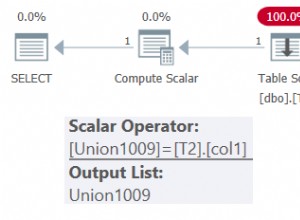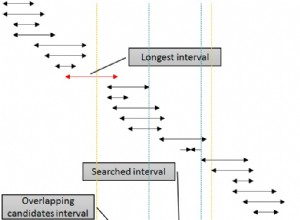J'ai compris votre solId était pour les solitications . Au départ, je pensais que cela signifiait solide (comme un rocher). Donc, cela peut être fait par la composition.
Notez qu'il y avait quelques fautes de frappe dans le schéma fourni. Quelques virgules manquantes, certains noms d'index dupés. Une table MyISAM changée en INNODB. J'ai donc fait quelques changements de nom. De plus, autour de la table 5, il manquait des tables. Ce n'est donc pas comme si votre script s'exécutait (pour la table rfqs ).
De même, le schéma suivant échouera en raison de vos tables manquantes fournies, quelque part autour de 60 à 70 %.
Tableaux jusqu'à présent :
create schema slipper;
use slipper;
CREATE TABLE `nsns` (
`ID` int(11) NOT NULL AUTO_INCREMENT,
`NSN` char(16) NOT NULL,
`Description` varchar(100) DEFAULT NULL,
`ShortDesc` varchar(20) DEFAULT NULL,
PRIMARY KEY (`ID`),
UNIQUE KEY `NSN_UNIQUE` (`NSN`)
) ENGINE=InnoDB AUTO_INCREMENT=42 DEFAULT CHARSET=latin7;
drop table if exists `solicitations`;
CREATE TABLE `solicitations` (
`ID` int(11) NOT NULL AUTO_INCREMENT,
`NSNId` int(11) NOT NULL,
`UOMId` int(11) NOT NULL DEFAULT '1',
`QUPId` int(11) NOT NULL DEFAULT '0',
`SolicitationNo` char(16) NOT NULL,
`Quantity` int(11) NOT NULL,
`ReturnByDate` date NOT NULL,
`StatusId` int(11) NOT NULL DEFAULT '1',
`Memo` text,
PRIMARY KEY (`ID`),
UNIQUE KEY `SolicitationNo_UNIQUE` (`SolicitationNo`),
KEY `NSN_idx1111` (`NSNId`),
KEY `NSN_idx1112` (`ID`,`NSNId`), -- atm an necessary evil. Revisit, perhaps collapse one
CONSTRAINT `NSNId` FOREIGN KEY (`NSNId`) REFERENCES `nsns` (`ID`)
) ENGINE=InnoDB AUTO_INCREMENT=10 DEFAULT CHARSET=latin7;
drop table if exists `parts`;
CREATE TABLE `parts` (
`ID` int(11) NOT NULL AUTO_INCREMENT,
`NSNId` int(11) NOT NULL,
`VendorId` int(11) NOT NULL,
`UOMId` int(11) NOT NULL DEFAULT '1',
`QUPId` int(11) NOT NULL DEFAULT '1',
`StatusId` int(11) DEFAULT '1',
`PartNo` varchar(45) DEFAULT NULL,
`Memo` text,
PRIMARY KEY (`ID`),
KEY `NSN_idx2222` (`NSNId`),
KEY `NSN_idx2223` (`ID`,`NSNId`), -- atm an necessary evil. Revisit, perhaps collapse one
CONSTRAINT `NSNId2222` FOREIGN KEY (`NSNId`) REFERENCES `nsns` (`ID`)
) ENGINE=InnoDB AUTO_INCREMENT=18 DEFAULT CHARSET=latin7;
drop table if exists `baserfqs`;
CREATE TABLE `baserfqs` (
`ID` int(11) NOT NULL AUTO_INCREMENT,
`NSNId` int(11) NOT NULL,
`BRFQNo` varchar(45) DEFAULT NULL,
`Memo` text,
`Finalized` bit(1) NOT NULL DEFAULT b'0',
PRIMARY KEY (`ID`),
UNIQUE KEY `BRFQNo_UNIQUE` (`BRFQNo`),
KEY `NSN_idx4444` (`NSNId`),
KEY `NSN_idx4445` (`ID`,`NSNId`), -- atm an necessary evil. Revisit, perhaps collapse one
CONSTRAINT `NSNId4444` FOREIGN KEY (`NSNId`) REFERENCES `nsns` (`ID`)
) ENGINE=InnoDB AUTO_INCREMENT=5 DEFAULT CHARSET=latin7;
CREATE TABLE `rfqs` (
`ID` int(11) NOT NULL AUTO_INCREMENT,
`BaseRFQId` int(11) NOT NULL,
`VendorId` int(11) NOT NULL,
`RFQNo` varchar(45) NOT NULL,
`StatusId` int(11) NOT NULL DEFAULT '6',
`DateSent` date DEFAULT NULL,
`DateResponded` date DEFAULT NULL,
`VendorNotes` text,
`QuotedBy` varchar(45) DEFAULT NULL,
`Title` varchar(45) DEFAULT NULL,
`ValidityCodeId` int(11) DEFAULT '4',
`UnitWt` decimal(10,3) DEFAULT NULL,
`WtUOMId` int(11) DEFAULT '1',
PRIMARY KEY (`ID`),
UNIQUE KEY `RFQNo_UNIQUE` (`RFQNo`),
KEY `BaseRFQId_idx` (`BaseRFQId`),
KEY `VendorId_idx` (`VendorId`),
KEY `StatusId_idx` (`StatusId`),
KEY `ValidityCodeId_idx` (`ValidityCodeId`),
KEY `WtUOMId_idx` (`WtUOMId`),
CONSTRAINT `WtUOMId` FOREIGN KEY (`WtUOMId`) REFERENCES `wtuoms` (`ID`),
CONSTRAINT `BaseRFQId` FOREIGN KEY (`BaseRFQId`) REFERENCES `baserfqs` (`ID`),
CONSTRAINT `StatusId` FOREIGN KEY (`StatusId`) REFERENCES `rfqstatus` (`ID`),
CONSTRAINT `ValidityCodeId` FOREIGN KEY (`ValidityCodeId`) REFERENCES `validitycodes` (`ID`),
CONSTRAINT `VendorId` FOREIGN KEY (`VendorId`) REFERENCES `vendors` (`ID`)
) ENGINE=InnoDB AUTO_INCREMENT=5 DEFAULT CHARSET=latin7;
drop table if exists `compTableX001`;
CREATE TABLE `compTableX001`
( -- a composition table for FK's in `baserfqssols`
`ID` int(11) AUTO_INCREMENT PRIMARY KEY,
`BaseRFQId` int(11) NOT NULL, -- baserfqs.ID
`SolId` int(11) NOT NULL, -- solicitations.ID
`NSNId` int(11) NOT NULL,
unique key (`BaseRFQId`,`SolId`), -- no dupes allowed
CONSTRAINT `tx001_base` FOREIGN KEY (`BaseRFQId`,`NSNId`) REFERENCES `baserfqs` (`ID`,`NSNId`),
CONSTRAINT `tx001_sol` FOREIGN KEY (`SolId`,`NSNId`) REFERENCES `solicitations` (`ID`,`NSNId`)
) ENGINE=InnoDB DEFAULT CHARSET=latin7;
drop table if exists `compTableX002`;
CREATE TABLE `compTableX002`
( -- a composition table for FK's in `rfqssolsparts`
`ID` int(11) AUTO_INCREMENT PRIMARY KEY,
`BaseRFQId` int(11) NOT NULL, -- baserfqs.ID
`SolId` int(11) NOT NULL, -- solicitations.ID
`PartId` int(11) NOT NULL, -- parts.ID
`NSNId` int(11) NOT NULL,
unique key (`BaseRFQId`,`SolId`,`PartId`), -- no dupes allowed
CONSTRAINT `tx002_base` FOREIGN KEY (`BaseRFQId`,`NSNId`) REFERENCES `baserfqs` (`ID`,`NSNId`),
CONSTRAINT `tx002_sol` FOREIGN KEY (`SolId`,`NSNId`) REFERENCES `solicitations` (`ID`,`NSNId`),
CONSTRAINT `tx002_part` FOREIGN KEY (`PartId`,`NSNId`) REFERENCES `parts` (`ID`,`NSNId`)
) ENGINE=InnoDB DEFAULT CHARSET=latin7;
drop table if exists `baserfqssols`;
CREATE TABLE `baserfqssols` (
`ID` int(11) auto_increment,
`compId` int(11) NOT NULL, -- composition ID `compTableX001`.`ID`
`LineItemNo` int(11) NOT NULL DEFAULT '1',
PRIMARY KEY (`ID`),
CONSTRAINT `basesol_compX001` FOREIGN KEY (`compId`) REFERENCES `compTableX001` (`ID`)
) ENGINE=InnoDB DEFAULT CHARSET=latin7; -- changed engine type
-- Is it possible to set up a foreign key constraint on RFQsSolsParts that requires SolId and PartId to reference records
-- that have the same NSNId, and requires RFQId to reference a BaseRFQId which has the same NSNId as the other two?
drop table if exists `rfqssolsparts`;
CREATE TABLE `rfqssolsparts` (
-- `RFQId` int(11) NOT NULL, -- requirement BBBBBBBBBBBBB
-- `SolId` int(11) NOT NULL, -- requirement AAAAAAAAA
-- `PartId` int(11) NOT NULL, -- requirement AAAAAAAAA
`ID` int(11) auto_increment,
`compId` int(11) NOT NULL, -- composition ID `compTableX002`.`ID`
`CondId` int(11) NOT NULL,
`UOMId` int(11) NOT NULL DEFAULT '1',
`QUPId` int(11) NOT NULL DEFAULT '1',
`UnitPrice` decimal(10,3) NOT NULL,
`LeadTime` int(11) DEFAULT NULL,
`LTCId` int(11) DEFAULT NULL,
`SplsNSNId` int(11) DEFAULT NULL,
`SetupCostInc` bit(1) NOT NULL DEFAULT b'0',
`CertCostInc` bit(1) NOT NULL DEFAULT b'0',
`MfgCerts` bit(1) NOT NULL DEFAULT b'0',
`Altered` bit(1) NOT NULL DEFAULT b'0',
`OrigPkg` bit(1) NOT NULL DEFAULT b'1',
`SplsContNo` varchar(45) DEFAULT NULL,
`SplsDate` date DEFAULT NULL,
-- PRIMARY KEY (`RFQId`,`SolId`,`PartId`)
PRIMARY KEY (`ID`),
CONSTRAINT `triplet_compX002` FOREIGN KEY (`compId`) REFERENCES `compTableX002` (`ID`)
) ENGINE=InnoDB DEFAULT CHARSET=latin7;
compTableX001 est comme une mini hiérarchie TwoParents-OneChild avec le nom ID . Donc ID est le nom de la parentalité. Il a deux parents (BaseRFQId et SolId ), et un enfant (NSNId ). Le nom ou l'identifiant, sous la forme ID , est la cible FK des baserfqssols ligne qu'il supporte. Référencé et Référencement , respectivement.
De même, compTableX002 semble résoudre les conditions maintenant pour la question 2.
nettoyage :
drop schema slipper;




